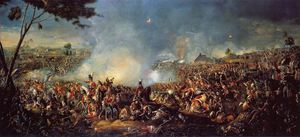নেপোলিয়নীয় যুদ্ধ
নেপোলিয়নীয় যুদ্ধ (১৮১৩-১৮১৫) বলতে নেপোলিয়ন বোনাপার্টের ফরাসি সাম্রাজ্য এবং গ্রেইট ব্রিটেন নেতৃত্বাধীন বিরোধী পক্ষের মধ্যে সংগঠিত ধারাবাহিক যুদ্ধকে বোঝানো হয়। এটি ফরাসি বিপ্লব দ্বারা উদ্ভাসিত হওয়া যুদ্ধসমূহের ধারাবাহিক ফল, তারা অভূতপূর্ব রূপে ইউরোপীয় সেনাবাহিনী গুলোতে বিপ্লব করে। নেপোলিয়নের সৈন্যদের ইউরোপ বিজয়ের পর ফরাসি শক্তি দ্রুত অবস্থান জানান দেয় কিন্তু তার আকস্মিক পতনও ঘটে অতি দ্রুত যখন ১৮১২ সালে রুশরা ফ্রান্সে আক্রমণ করে। নেপোলিয়ন ১৮১৪ সালে প্রথমবারের মতো পরাজয় বরণ করেন এবং তিনি ফিরে গিয়ে ওয়াটারলু যুদ্ধে পরাজিত হন। যুদ্ধের পর বিজয়ীরা ফরাসিদের সকল উপার্জন কেড়ে নেয়।
| নেপোলিয়নীয় যুদ্ধ | |||||||
|---|---|---|---|---|---|---|---|
  উপড়ে: অস্ট্রেলিয যুদ্ধ নিচে: ওয়াটারলু যুদ্ধ | |||||||
| |||||||
| বিবাদমান পক্ষ | |||||||
|
|
Co-belligerent | ||||||
| সেনাধিপতি ও নেতৃত্ব প্রদানকারী | |||||||
|
|
| ||||||
| হতাহত ও ক্ষয়ক্ষতি | |||||||
| ৩৩,৫০,০০০ থেকে ৬৫,০০,০০০ পর্যন্ত | |||||||
|
Notes
| |||||||
চূড়ান্ত বিজয়ের পূর্বে সাত জোটের মধ্যে পাঁচটিই ফরাসিদের কাছে পরাজয় লাভ করে। প্রথম ও দ্বিতীয় জোটকে ফরাসিরা হারায় ফরাসি বিপ্লবের সময়; তৃতীয়, চতুর্থ ও পঞ্চম জোটকে নেপোলিয়নীয় ফ্রান্স হারায়। এই মহান বিজয়গুলো ফরাসিদের মধ্যে একত্রবোধ জন্ম দেয়, বিশেষ করে যখন তারা মস্কো প্রবেশ করে। কিন্তু রুশরা হঠিয়ে দেবার পর ফরাসিদের ভাগ্য বদলাতে থাকে, ফ্রান্স ষষ্ঠ জোটের কাছে লিপজিগ যুদ্ধে এবং ওয়াটারলু যুদ্ধে সপ্তম জোটের হাতে পরাজয় বরণ করে।
এই যুদ্ধ সমূহের ফলাফল পবিত্র রোম সাম্রাজ্য শিথিলকরণ করে এবং জার্মানি ও ইতালিতে জাতীয়তাবাদের বীজ বপণ করে, যা সেই শতাব্দীর শেষের দিকে দুই রাষ্ট্রকে একাত্ম করতে সক্ষম হয়। ঠিক সেই সময়ই, ফরাসিদের স্পেন দখলের কারণে বিশ্বব্যাপী ছড়িয়ে থাকা স্পেনীয় সাম্রাজ্য দুর্বল হতে থাকে, যা পরবর্তীতে মার্কিন স্পেনে স্বাধীনতা সংগ্রামের সূচনা ঘটায়। ব্রিটিশ সাম্রাজ্যে নেপোলিয়নীয় যুদ্ধের সরাসরি প্রভাব পড়ে, তারা পরবর্তী শতাব্দীতে শীর্ষস্থানীয় পরশক্তিতে পরিণত হয়।
আরও দেখুন সম্পাদনা
তথ্যসূত্র সম্পাদনা
- ↑ Office of the Historian - Milestones - 1801-1829 - Napoleonic Wars and the United States ওয়েব্যাক মেশিনে আর্কাইভকৃত ১৩ জুন ২০১৩ তারিখে. History.state.gov. Retrieved on 2013-07-12.
- ↑ James R. Arnold: Napoleon Conquers Austria: The 1809 Campaign for Vienna, ABC-Clio, 2003 [১]
- ↑ The Austrian Imperial-Royal Army (Kaiserliche-Königliche Heer) 1805 – 1809: The Hungarian Royal Army [২]
- ↑ Todd Fisher: The Napoleonic Wars: The Empires Fight Back 1808-1812, Oshray Publishing, 2001 [৩]
- ↑ Robert Vaughan: The Case of Hungary, The British Quarterly Review, Volume 14, London, 1851 [৪]
বহিঃসংযোগ সম্পাদনা
- The Napoleonic Wars Exhibition held by The European Library ওয়েব্যাক মেশিনে আর্কাইভকৃত ২৭ এপ্রিল ২০১৪ তারিখে
- 15th Kings Light Dragoons (Hussars) Re-enactment Regiment
- 2nd Bt. 95th Rifles Reenactment and Living History Society
- The Napoleonic Wars Collection Website
- Napoleon, His Army and Enemies
- Napoleonic Guide
- War and Peace by Leo Tolstoy
- Napoleonic Wars